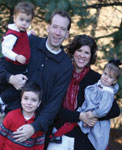7 ways to trick your children into loving books

What’s your favorite picture of you as a child? Is it the black-and-white picture of you in 1970s plaid pants, or the ’80s snapshot with you and a big head of hair? (I’m guilty of both.)
I’m not entirely sure what picture of my own children is my favorite, but the leading contender likely is one I snapped several months back, with all three of them—ages 5, 2 and 2—on the couch, each of them looking at a different book.
As a parent, those moments when you see the fruit of your labor are precious, aren’t they? You spend hours and hours teaching them something and think it’s never going to sink in, and then all of a sudden, God gives you a gift that makes it all worthwhile. It’s as if He was telling me, “Keep giving books to your kids.”
Reading, though, isn’t as popular in the U.S. as it once was. The latest data from 2013 shows American teens rank 17th in the world in reading—a tragic stat because reading forms the core of nearly every other type of learning. Perhaps that failure begins at home: Only one in three parents of children 8 and under read to their kids each night, according to a 2013 survey by Reading is Fundamental and Macy’s.
Looking back on the past few years, I can see what my wife and I did right in raising children who like books—and what we could have done better. Of course, children learn to read at different paces, but even kids who can’t read can enjoy books. Here are seven tips to raising kids who like books:
1. Read to them, and then read to them some more. There may be nothing sweeter than a clean baby, a clean diaper, and a book in your lap. We started reading to our first child well before he turned 1—and he tried to eat the pages. He eventually learned better.
2. When it’s safe, place board books in the child’s toy area and crib. Here’s what happens: Children begin seeing books as toys, as something fun (which a book is). Soon, they may even choose a book over a ball. Gradually, you can give them books instead of toys. Make sure the books aren’t out of their reach. Tip: Don’t stress out if they tear apart some of the books. It’s going to happen. Used kids’ books are cheap, anyway.
3. Keep books in your car. Our 2-year-old twins enjoy looking at books while riding down the road, as does their older brother. The attention span of a toddler on a book often is only a minute or two, but it nevertheless will help build a good trait.
4. As they grow, buy them books that match their interest—and use them as rewards in place of toys and suckers. When our son had an interest in yard squirrels, I got him a board book (“The Busy Little Squirrel”) about them. Over the next few years, I did the same thing when he became fascinated with planets, then bears, then dinosaurs, and then modern-day animals. Amazon.com is a great place to learn what’s out there. Half.com has inexpensive books. Also, buy cheap books at a used bookstore or a salvage store.
5. Visit a library—often. Libraries are like that restaurant buffet that has a bit of something for everyone, including the one food that gets you most excited. I won’t ever forget my son’s first trip to the library with me. He couldn’t believe all the books he had never seen. When I told him we could take some of them home, he was giddy.
6. Limit media usage. Experts recommend no screen time for children under 2, and very little screen time for kids over 2. The more TV shows our children watch and video games they play, the less likely it is they’ll want to read a book. Half of the parents in that Reading is Fundamental survey referenced earlier said their children spend more time watching TV and playing video games than they do reading.
7. Set the example. If our children see us reading, they’ll be more likely to read, too. Some of my best conversations with my oldest son have taken place when he saw me reading and asked what my book was about. “God,” I often said.
It’s hard to beat that.
— by Michael Foust
Foust is the father of three small children, a writer and editor, and blogs about parenting at www.michaelfoust.com.





